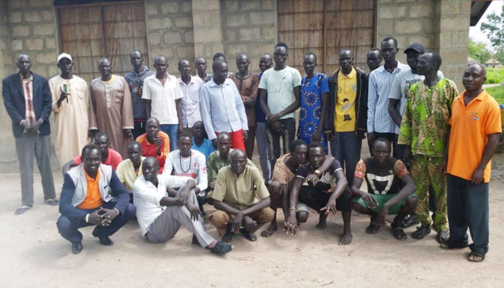Breaking Down Barriers to Peace

In Rumbek, South Sudan, a community where Nonviolent Peaceforce (NP) works, facial scarring is a rite of passage for many boys. In this painful process, if a young man cries during his three-hour scarification ceremony, he is often mocked. Boys are led to believe that being a man means one must not cry or show signs of pain.
Facial scarification is a more controversial topic than it has been in previous generations as more people move to urban areas where it is less common. Others want scarification to end because they believe it creates barriers between groups of people or poses a health risk.
Taban, a young father who has attended Nonviolent Peaceforce trainings, believes these forehead marks are dangerous. When he was 17 years old, he went through a painful scarification process, where his skin was raised with a sharp object and cut off with a razor blade, creating permanent scars.
He remembers vividly the pain he had for a month before the scars healed. He doesn’t want his son to go through that too. Taban questioned the representation of masculinity he saw around him. After his scarification, he was assigned “men’s roles” such as harvesting fields and cleaning cows. But Taban didn’t feel that anything in him changed. What was the point of all that pain?
“The scarification process is not vital because it doesn’t change you internally. It just encourages tribalism. People fail to realize they are one nation,” explained Taban.
Men and boys from Taban’s community wanted to reduce violence between tribes. They have seen the harmful aspects of this practice and the impact on gender relations.
After speaking with one another, the group decided that facial scarification should end. They felt equipped by NP’s training and used their newfound tools and resources to widely campaign in their community.
To show their commitment to changing their community, they pledged to one another to apply their knowledge to life at home. In thinking about ways to reduce violence, Taban and a group of men and boys decided to lead a public campaign against facial scarification.

Some men and boys of Rumbek.
“My children will not be initiated into this scarification practice even if they go to dwell in a cattle camp. I will also be personally responsible for taking care of my wife and children,” said Taban.
Taban is not worried about his son being made fun of. He will offer his son assurance that he will still be a man even without the scars. Not only are these men refusing to participate in this rite of passage, they are committed to changing gender norms in their own homes.
“I am currently helping my wife at home with sweeping the floor. I will continue to do this even if other family members are in my home. I will pass on the information the NP training has provided to my children and peers,” said Dut, another community member.
These men and boys may encounter resistance in their homes and communities, but they believe that change can happen through education and modeling nonviolence. They have taken on a nonviolent public campaign with the goal of keeping their children safe from pain and improving gender relations in the community. It is a community-led effort that speaks of the transformative nature of nonviolence.
You and I can be encouraged by community transformation that is happening in places like South Sudan. Together we are working towards peace and equality for all.
*Photo not of Taban.
